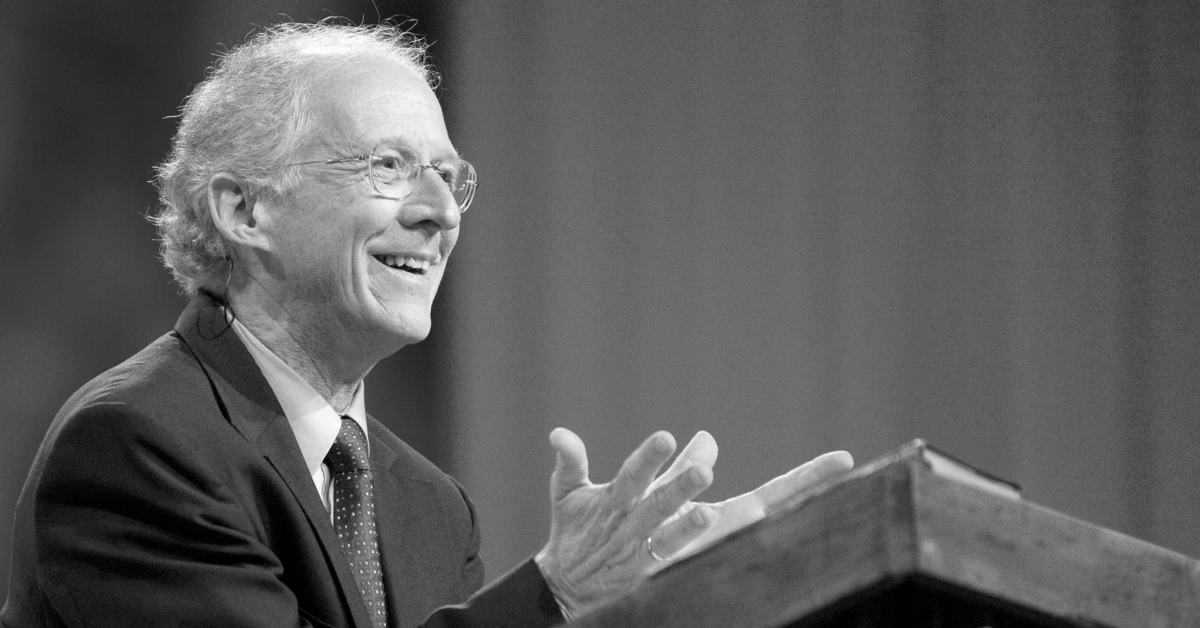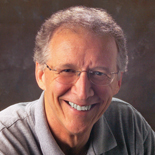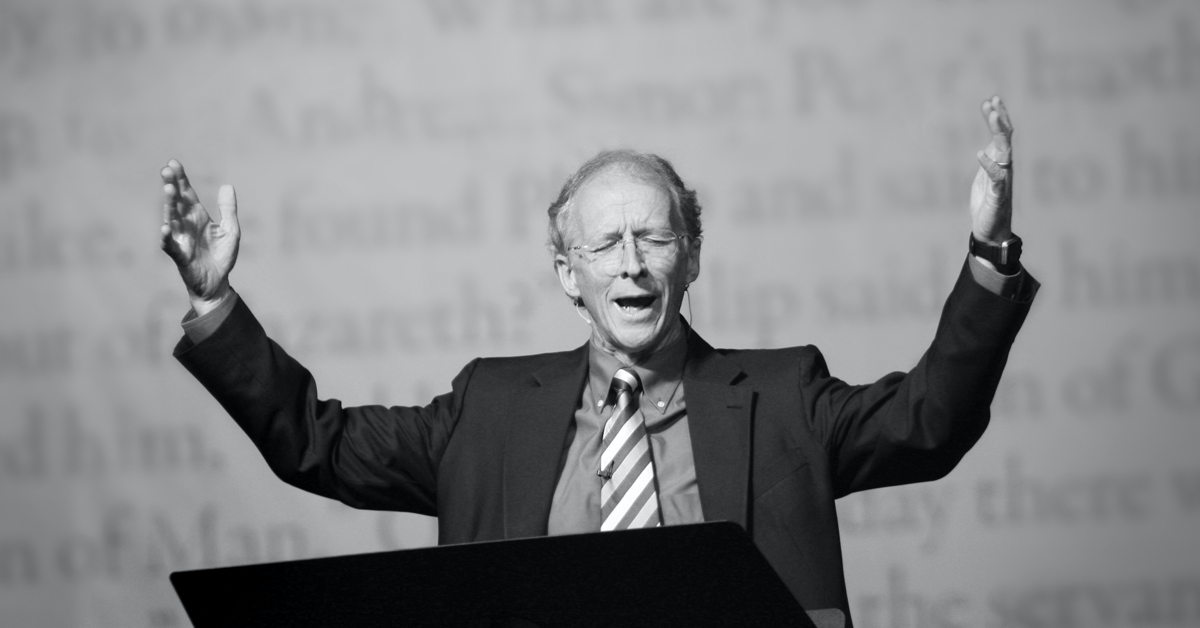John Piper: Captured by the All-Embracing Sovereignty of God
John Piper has spent a lifetime committed to pursuing God as his ultimate goal. He pastored a church for 33 years, has written over 50 books, and advocates for all believers to “think for the glory of God.”
1946–63
Childhood & teenage years
John Stephen Piper was born in Chattanooga, TN, in 1946 to parents Bill and Ruth Piper, who had met while attending Bob Jones University. He has one older sister, Beverly, born in 1943.
His father committed his life to evangelism after preaching the gospel for the first time at 15 years old, leading 10 people to Christ. In 1945 Bill was elected as the youngest trustee of Bob Jones University, and when the school relocated 180 miles east to Greenville, SC, the Piper family relocated with it.
Piper’s parents influenced his faith significantly during those formative years. Because his father traveled extensively, his mother carried the weight of raising the kids and managing the household. She taught young John everything from how to mow the lawn and splice an electric cord to cooking tips, and "burned the midnight oil. Her hands were never idle." According to Piper, there was nothing his mother couldn’t do—her intense work ethic and love impacted him greatly. But most importantly, she influenced him spiritually. He writes in his candidating testimony: “She stamped me more than anybody in the world. . . . She didn’t give me the content of my theology, because she wasn't very much of a theologian, but she shaped the way I approach life.”
Though Piper didn’t hear many of his father’s sermons, the few he did profoundly impacted him. Piper would later recount those experiences in his book Don’t Waste Your Life, saying that he “trembled to hear [his] father preach . . . the whole thing struck me as absolutely blood-earnest.” Piper learned the importance of wisdom and love within a fundamentalist context from his father, who prepared him for his future as a teacher and preacher.
Explore John Piper’s works:


1964–1967
Wheaton College
After graduating from high school, Piper left his fundamentalist upbringing for Wheaton College. He majored in literature and minored in philosophy, and while at Wheaton, his understanding of Christendom broadened.
As a freshman, he was introduced to the writings of C. S. Lewis through Mere Christianity and then devoured many more of Lewis’ works like Surprised by Joy and The Problem of Pain. Piper wrote about Lewis in Don’t Waste Your Life, saying: “I would not have lived my life with as much joy and usefulness as I have. . . . I will never cease to thank God for this remarkable man who came onto my path at the perfect moment.” Lewis’ writings planted the seeds for Piper’s exploration of what he called “Christian hedonism,” which would manifest more fully during his time at Fuller (more on this below). Piper’s reflections during this time reveal his deep desire to please God and make his life count.
In 1966 Piper met Noël Henry (1947– ), whom he married in 1968. Together they have six children.
Though he did well at Wheaton, Piper struggled with a debilitating psychological and physiological fear of speaking from the time he was a little boy, which prevented him from speaking in front of groups, small or large. He describes that season as “one filled with embarrassment, humiliation, and loneliness.” However, he writes that “God stepped in” while he was at Wheaton when the school chaplain asked him to say a prayer one day in front of 500 people. Piper answered yes, then panicked and told God if he would carry him through it without humiliating himself, he would never say no to another request to speak. He stepped out in faith, retelling the story in Don’t Waste Your Life: “I made a vow, and he (God) did it. And I just feel like something broke. I don’t know what!”
Soon after this breakthrough, Piper felt God calling him to the ministry of the Word.
Explore books that influenced John Piper:
If you don’t feel strong desires for the manifestation of the glory of God, it is not because you have drunk deeply and are satisfied. It is because you have nibbled so long at the table of the world. Your soul is stuffed with small things, and there is no room for the great.

1968–1970
Fuller Theological Seminary
From 1968–1971 Piper attended Fuller Theological Seminary, where his hermeneutics professor, Daniel P. Fuller (the son of the school’s founder), recommended reading works by Jonathan Edwards. Years later in his candidating testimony, Piper described Fuller as “the most significant living person in shaping the way I think today as far as my theology goes” and Edwards as “the most important dead teacher outside the Bible.” Piper’s book Reading the Bible Supernaturally (2017) later echoed Edwards’ call some 250 years prior for people to read their Bibles. (Hear Piper share about the book in the video below.)
While at Fuller Piper continued wrestling over the human will and the sovereign glory of God and eventually embraced Calvinism. In the fall of 1970, Piper did an independent study with Fuller on Edwards’ book The Freedom of the Will, which heavily influenced him. He also confronted the issue of unconditional election and irresistible grace during this time—Romans 9 became a pivotal chapter in his life. In a school paper later titled “The Absolute Sovereignty of God,” Piper writes that Romans 9 was “like a tiger going about devouring free-willers like me.” He later said Romans 9 kickstarted his lifelong passion for seeing God’s supremacy in everything.
C. S. Lewis’ sermon The Weight of Glory introduced Piper to what he later called “Christian hedonism.” In his book Desiring God: Meditations of a Christian Hedonist (2003), Piper describes “Christian hedonism” as “God being most glorified in us when we are most satisfied in him.”
During his senior year at Fuller, he was fortunate to study under Clyde S. Kilby, a professor of English and the leading C. S. Lewis scholar in America at the time. Kilby encouraged reading G. K. Chesterson's Orthodoxy, a work that Piper says changed his life. Martin Lloyd-Jones’ two-volume collection of sermons on Studies in the Sermon on the Mount also left an indelible mark on him. Later Piper would write that Lloyd-Jones’ sermons “touched my life as much as any sermons ever.” Piper’s discovery of these works would later influence his book Desiring God.
Hear from Piper about his book Reading the Bible Supernaturally:
Read more books that influenced John Piper:
The ultimate goal of God in giving us the Bible is that his infinite worth and beauty would be magnified in the white-hot worship of the bride of Christ gathered from all the peoples of the world.



1971–1979
Teaching
After seminary until 1974, Piper continued his schooling at the University of Munich. His dissertation, Love Your Enemies (1974), focused heavily on “the nature of motivation for loving our enemies and the role of God’s Spirit in bringing about enemy love.”
Upon graduation, he returned to the United States with his wife and young son, Karsten—his doctorate of theology in hand. The family settled in St. Paul, Minnesota, where Bethel College hired him as an assistant professor of biblical studies. He taught there until 1980. Piper enjoyed teaching but longed to shepherd a flock consistently so that he could draw people in need of a Savior into the light of God’s presence.
Sadly, that same year Piper lost his beloved mom in a tragic bus accident while touring Israel. In her eulogy, Piper said that it was God who equipped his mother to do good, “working in her that which was pleasing in his sight through Jesus Christ; to Him be glory for ever and ever. Amen [Heb 13:21].” He called her “the happiest woman I have ever known,” and affirmed his strong work ethic comes from his upbringing. Though devastated, Piper interpreted her passing through the lens of Romans 8:28, rejoicing in the cross that covered her sins.
Explore more John Piper books:
The command of enemy love, as part of the New Testament given “by grace” and “through the Lord,” is a seed sown by the Spirit’s gifted servants, in the ground of the renewed heart, which the Spirit himself has created, so that the fruit which springs up in the attitude and action of the Christian is indeed the fruit of the Spirit.

1980–2013
Pastorate years
In 1980 the longing to pastor a church became a reality. Piper was asked to pastor Bethlehem Baptist Church in Minneapolis, MN, where he worked for 33 years and wrote more than 50 books.
Piper confessed in Bloodlines: Race, Cross, and the Christian that he was “manifestly racist” as a young adult (at the time, his hometown of Greenville had legally mandated separation of the races), something he still regrets. However, his views had dramatically shifted while in college and graduate school. After accepting the pastorate at Bethlehem, he moved to South Minneapolis—the most ethnically diverse neighborhood in the United States. On January 4, 1996, he preached the first “Ethnic Harmony” sermon, “Racial Reconciliation: Unfolding Bethlehem’s Fresh Initiative #3,” and from then on, Piper preached on racial harmony every year on Martin Luther King Jr. weekend.
Piper’s parents’ relationship deeply influenced his views on the role of men and women in the Church, and in 1987, he coauthored Recovering Biblical Manhood and Womanhood with Wayne Grudem on gender role complementarianism.* In his book Complementarianism, Sam Storms says complementarianism “asserts that God created both men and women in his image with distinct roles and responsibilities that each is to fulfill in both church and home” expressed in the biblical terms “headship” and “submission.”
Piper did not correlate submission with incompetence—he saw his upbringing as a beautiful design of a father and mother who trusted God and believed that obedience to his Word would lead to a healthy family structure. Piper, Grudem, and others later founded the Council of Biblical Manhood and Womanhood—the flagship organization for the topic.
Almost a decade later Piper founded Desiring God Ministries (1994) followed by The Bethlehem Institute in 1998, which has now developed into Bethlehem College and Seminary (2009). In 2006 he was diagnosed with prostate cancer, which was successively treated, and on Easter 2013, he gave his last sermon at Bethlehem Church.
Explore more John Piper resources written during his pastorate years:
What matters is that Christ goes on being preached.

2014 – today
Today Piper is a popular speaker for parachurch ministries and is devoted to a revival of God-centered worship, sound doctrine, and mission (like the Passion conferences, Together for the Gospel, The Gospel Coalition, etc.). He is a prolific author, speaker, and teacher for Desiring God and is known for his diligent attention to exegetical detail in Bible study. His conviction in the all-embracing sovereignty of God and Christian hedonism has never waivered.
Even the pandemic in 2020 did not slow his ministry down. In fact, in his article “Plans for 2021 and Beyond,” he said having to stay inside at his desk was “a painful gift.” During that time, he finished 252 episodes of Look at the Book on Ephesians and 50 episodes on 1 Thessalonians. He also wrote Coronavirus and Christ to help Christians redirect their fears and concerns about the uncertainty in this world to God, who “is sovereign, ordains, governs, and reigns over all things.”
Most recently in 2021 he released Providence, a book 20 years in the making. In it, he posits that God is not only sovereign but has the authority, right, and power to do whatever he pleases—and he tells readers why. (Read an excerpt here.)
Piper still attends the church where he preached for 33 years and is designated pastor emeritus.
Hear how Piper uses the Logos Bible app for Bible study, message prep, and more:
Explore John Piper’s recent works:
Explore These Best-Selling Resources by John Piper:
Sources consulted:
- The above work leaned heavily on Justin Gerald Taylor’s work: John Piper: The Making of a Christian Hedonist, 2015, Southern Baptist Theological Seminary.
Other works consulted:
- D. A. Carson, introduction to John Piper’s lecture-sermon on “The Triumph of the Gospel in the New Heavens and New Earth,” The Gospel Coalition Conference (May 24, 2007). Piper’s talk is available online, but the introduction was not recorded.
- John Piper, Don’t Waste Your Life (Wheaton, IL: Crossway, 2003), 18.
- “John Piper’s Hero,” The Real John Piper, accessed 5 April 2022.
- John Piper, "God Raised Your Great Shepherd from the Dead: A Farewell Sermon," March 31, 2013, (accessed 22 April 2022).
- John Piper and Wayne Grudem, Recovering Biblical Manhood and Womanhood (Crossway, 2017)
- John Piper, "Think: The Life of the Mind and the Love of God," Desiring God, accessed 22 April 2022.
- John Piper, “Submission and Headship in the Home Where I Grew Up,” Desiring God, accessed 15 April 2022.
*Complementarianism is the idea that the Bible teaches that men and women are equal in value and dignity and have distinct and complementary roles in the home and church. The Council on Biblical Manhood and Womanhood, “Mission and Values,” accessed 20 April 2022.